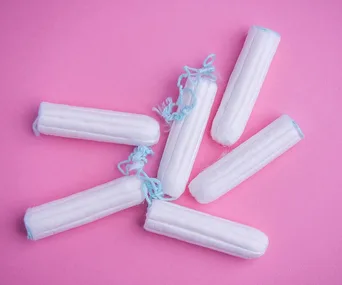When the tampon tax “debate” – if we can call it that – was at its peak last year, some dismissed it as somewhat of a trivial complaint in the scheme of things – aren’t there worse things going on in the world?
But Rochelle Courtenay, founder of charity Share the Dignity – a charity that donates tampons and pads to women in need, explained just how devastating the effects of the, frankly sexist, tax are.
“If you look at it from our point of view, we’ve collected 700,000 packets of pads and tampons since Share the Dignity started 2 years ago,” she told Now To Love.
WATCH: Why exactly are sanitary items still considered “luxury items” in Australia?
“We’ve paid over $300,000 – all of us as we’ve donated one packet here and there – in tax and GST that shouldn’t be there, for women who can’t afford it anyway.”
The tax seems especially discriminatory given that the government just launched a $122 million postal plebiscite.
“They don’t think that the $26 million that they take in each year from us having our periods can be wiped away because it’s too much money, but then they have enough money to spend $122 million on a postal plebiscite whether somebody loves somebody,” Rochelle sighed.
“It just doesn’t make sense, it makes my blood boil. It’s ridiculous.”
The excessive price of sanitary items doesn’t only affect homeless women living rough on the street.
“I met a girl in Melbourne and the week before she’d gotten her period at school,” Rochelle recalled.
“She stained the back of her dress and all the boys laughed at her, you know, that’s happened to all of us, right?
“Then she went home to ring mum to ask if she could get some pads or tampons but the mum didn’t get paid until Thursday, so this young girl missed two-and-a-half days of school. And it’s not uncommon.”
It’s for that reason Share the Dignity has made sure to install their iconic pink boxes which dispense packs of tampons and pads for free in multiple schools across the country.
“We’re not talking about every school; we’re talking about schools where 40% of the families are on welfare,” Rochelle explained to Now To Love.
“We also look at the education of periods. We now have a lot of refugees who live in Australia and the education of menstruation is sometimes just not there.”
However, the charity does a lot more than just hand out sanitary items. Aside from giving women back their self-respect and sense of humanity with such a simple gesture, they’re heavily involved with domestic violence initiatives.
It’s no secret that women are disproportionately homeless because of domestic violence.
A report found that between 2011 and 2014, 187,000 people accessed homelessness services because of family violence, and most of those were women and children. Despite accounting for 36 per cent of the total demand on homelessness service the number is, if anything, conservative.
“Because women often feel ashamed talking about the violence they experience,” Annette Gillespie, the chief executive officer of Victorian family violence response centre Safe Steps, told ABC.
“It’s very possible there are thousands of women working with services across Victoria and Australia as a whole who have not identified to their worker the violence they are living with, and then who are at greater risk because they’re not getting the appropriate support.”
As a result, Rochelle has been sure to emphasise how those suffering from domestic violence know how to seek help.
When I first started I was at a Homeless Connect event and I was handing a packet of pads and tampons to a woman who was living in a car with her two kids,” she explained.
“I was saying to her: ‘Have you rung 1800 RESPECT? Why have you not rung 1800 RESPECT’, and she didn’t even know it existed.
“So I was handing her a packet of tampons and I thought, ‘how awesome would it be to put the number in the top of the tampon box?’ That way women may see it.
“We lost 75 women last year, 80-something the year before. We would drain the oceans if we lost that many men to shark attacks in Australia, yet we’re not doing enough about it.”
With the help of partner Cottons, Rochelle was able to do that and so much more.
“Cottons has been the most influential in the things we’ve done, when we want something, they just do it,” Rochelle said.
While Cottons has gone above and beyond to help Share the Dignity, Rochelle has far lower expectations when it comes to aid from the government, deeming hopes of help pointless.
“I know that they’re not going to do anything so what is the point?
“My wish list is just to take the GST off because simply it’s not fair and it’s not right. It’s a basic human right to have access to sanitary items – it’s not a luxury. Ferrero Rochers are a luxury in my house.”


